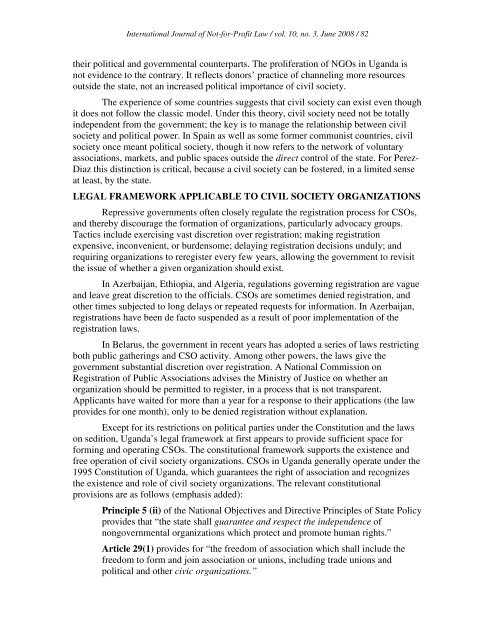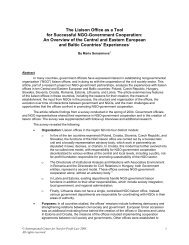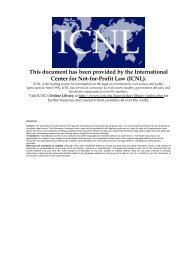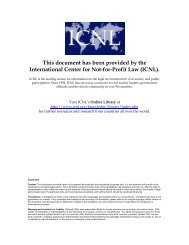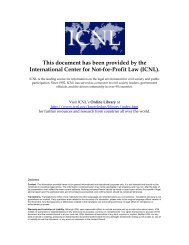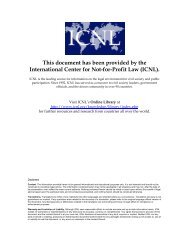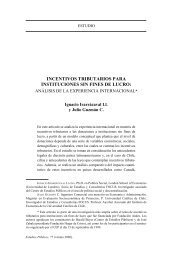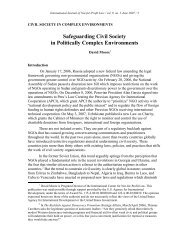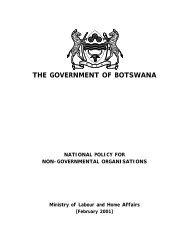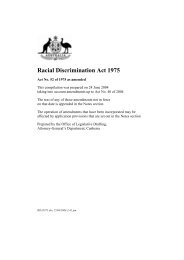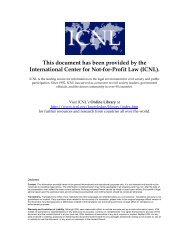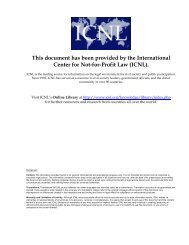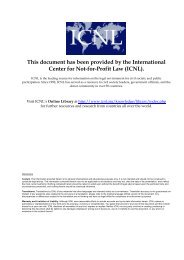Rising from the Ashes: The Rebirth of Civil Society in an ...
Rising from the Ashes: The Rebirth of Civil Society in an ...
Rising from the Ashes: The Rebirth of Civil Society in an ...
You also want an ePaper? Increase the reach of your titles
YUMPU automatically turns print PDFs into web optimized ePapers that Google loves.
International Journal <strong>of</strong> Not-for-Pr<strong>of</strong>it Law / vol. 10, no. 3, June 2008 / 82<br />
<strong>the</strong>ir political <strong>an</strong>d governmental counterparts. <strong>The</strong> proliferation <strong>of</strong> NGOs <strong>in</strong> Ug<strong>an</strong>da is<br />
not evidence to <strong>the</strong> contrary. It reflects donors’ practice <strong>of</strong> ch<strong>an</strong>nel<strong>in</strong>g more resources<br />
outside <strong>the</strong> state, not <strong>an</strong> <strong>in</strong>creased political import<strong>an</strong>ce <strong>of</strong> civil society.<br />
<strong>The</strong> experience <strong>of</strong> some countries suggests that civil society c<strong>an</strong> exist even though<br />
it does not follow <strong>the</strong> classic model. Under this <strong>the</strong>ory, civil society need not be totally<br />
<strong>in</strong>dependent <strong>from</strong> <strong>the</strong> government; <strong>the</strong> key is to m<strong>an</strong>age <strong>the</strong> relationship between civil<br />
society <strong>an</strong>d political power. In Spa<strong>in</strong> as well as some former communist countries, civil<br />
society once me<strong>an</strong>t political society, though it now refers to <strong>the</strong> network <strong>of</strong> voluntary<br />
associations, markets, <strong>an</strong>d public spaces outside <strong>the</strong> direct control <strong>of</strong> <strong>the</strong> state. For Perez-<br />
Diaz this dist<strong>in</strong>ction is critical, because a civil society c<strong>an</strong> be fostered, <strong>in</strong> a limited sense<br />
at least, by <strong>the</strong> state.<br />
LEGAL FRAMEWORK APPLICABLE TO CIVIL SOCIETY ORGANIZATIONS<br />
Repressive governments <strong>of</strong>ten closely regulate <strong>the</strong> registration process for CSOs,<br />
<strong>an</strong>d <strong>the</strong>reby discourage <strong>the</strong> formation <strong>of</strong> org<strong>an</strong>izations, particularly advocacy groups.<br />
Tactics <strong>in</strong>clude exercis<strong>in</strong>g vast discretion over registration; mak<strong>in</strong>g registration<br />
expensive, <strong>in</strong>convenient, or burdensome; delay<strong>in</strong>g registration decisions unduly; <strong>an</strong>d<br />
requir<strong>in</strong>g org<strong>an</strong>izations to reregister every few years, allow<strong>in</strong>g <strong>the</strong> government to revisit<br />
<strong>the</strong> issue <strong>of</strong> whe<strong>the</strong>r a given org<strong>an</strong>ization should exist.<br />
In Azerbaij<strong>an</strong>, Ethiopia, <strong>an</strong>d Algeria, regulations govern<strong>in</strong>g registration are vague<br />
<strong>an</strong>d leave great discretion to <strong>the</strong> <strong>of</strong>ficials. CSOs are sometimes denied registration, <strong>an</strong>d<br />
o<strong>the</strong>r times subjected to long delays or repeated requests for <strong>in</strong>formation. In Azerbaij<strong>an</strong>,<br />
registrations have been de facto suspended as a result <strong>of</strong> poor implementation <strong>of</strong> <strong>the</strong><br />
registration laws.<br />
In Belarus, <strong>the</strong> government <strong>in</strong> recent years has adopted a series <strong>of</strong> laws restrict<strong>in</strong>g<br />
both public ga<strong>the</strong>r<strong>in</strong>gs <strong>an</strong>d CSO activity. Among o<strong>the</strong>r powers, <strong>the</strong> laws give <strong>the</strong><br />
government subst<strong>an</strong>tial discretion over registration. A National Commission on<br />
Registration <strong>of</strong> Public Associations advises <strong>the</strong> M<strong>in</strong>istry <strong>of</strong> Justice on whe<strong>the</strong>r <strong>an</strong><br />
org<strong>an</strong>ization should be permitted to register, <strong>in</strong> a process that is not tr<strong>an</strong>sparent.<br />
Applic<strong>an</strong>ts have waited for more th<strong>an</strong> a year for a response to <strong>the</strong>ir applications (<strong>the</strong> law<br />
provides for one month), only to be denied registration without expl<strong>an</strong>ation.<br />
Except for its restrictions on political parties under <strong>the</strong> Constitution <strong>an</strong>d <strong>the</strong> laws<br />
on sedition, Ug<strong>an</strong>da’s legal framework at first appears to provide sufficient space for<br />
form<strong>in</strong>g <strong>an</strong>d operat<strong>in</strong>g CSOs. <strong>The</strong> constitutional framework supports <strong>the</strong> existence <strong>an</strong>d<br />
free operation <strong>of</strong> civil society org<strong>an</strong>izations. CSOs <strong>in</strong> Ug<strong>an</strong>da generally operate under <strong>the</strong><br />
1995 Constitution <strong>of</strong> Ug<strong>an</strong>da, which guar<strong>an</strong>tees <strong>the</strong> right <strong>of</strong> association <strong>an</strong>d recognizes<br />
<strong>the</strong> existence <strong>an</strong>d role <strong>of</strong> civil society org<strong>an</strong>izations. <strong>The</strong> relev<strong>an</strong>t constitutional<br />
provisions are as follows (emphasis added):<br />
Pr<strong>in</strong>ciple 5 (ii) <strong>of</strong> <strong>the</strong> National Objectives <strong>an</strong>d Directive Pr<strong>in</strong>ciples <strong>of</strong> State Policy<br />
provides that “<strong>the</strong> state shall guar<strong>an</strong>tee <strong>an</strong>d respect <strong>the</strong> <strong>in</strong>dependence <strong>of</strong><br />
nongovernmental org<strong>an</strong>izations which protect <strong>an</strong>d promote hum<strong>an</strong> rights.”<br />
Article 29(1) provides for “<strong>the</strong> freedom <strong>of</strong> association which shall <strong>in</strong>clude <strong>the</strong><br />
freedom to form <strong>an</strong>d jo<strong>in</strong> association or unions, <strong>in</strong>clud<strong>in</strong>g trade unions <strong>an</strong>d<br />
political <strong>an</strong>d o<strong>the</strong>r civic org<strong>an</strong>izations.”


